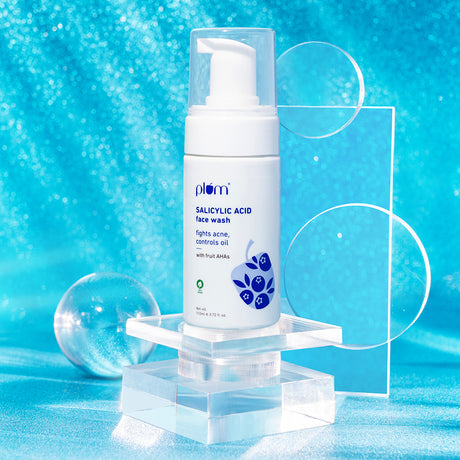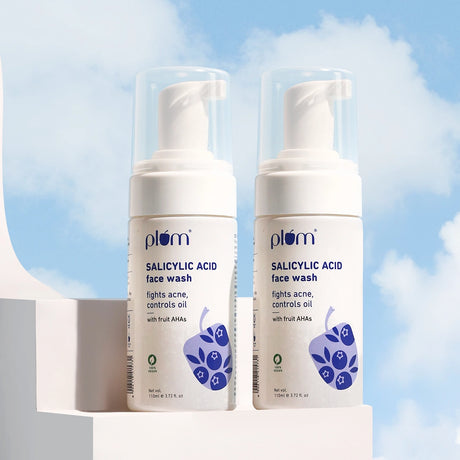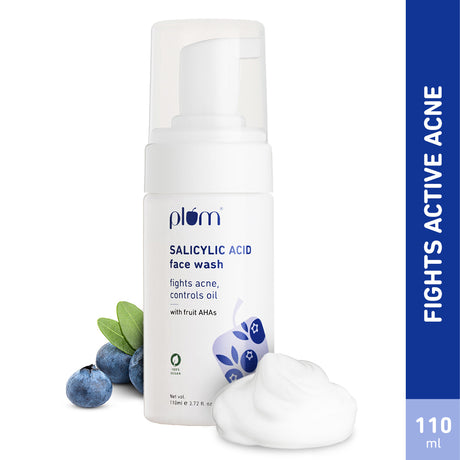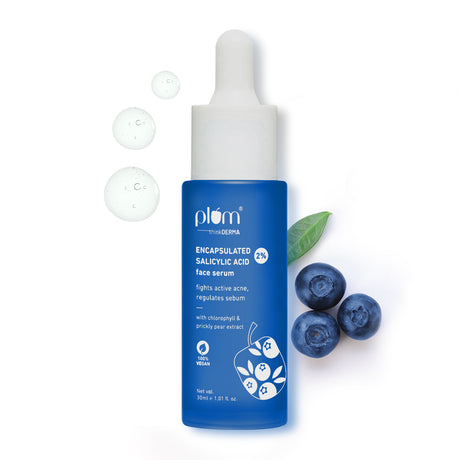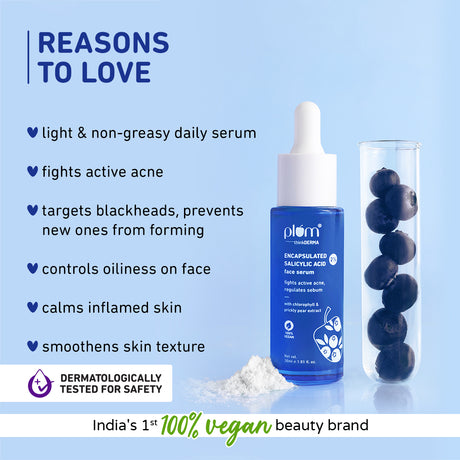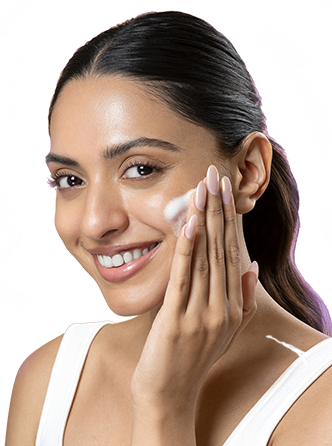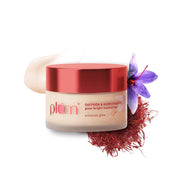
IN THIS ARTICLE
Considering acne and pimples are one of the most common skin concerns faced by people worldwide, no wonder “ how to remove acne” is a question widely searched on search engines.
Additionally, zits have the most inconvenient time to pop up on your skin, just before a crucial event where you need to look your best.
Thankfully, these painful guests are not impossible to get rid of. With the right acne treatment, you can remove acne from your face and prevent it from reappearing. While there are numerous home remedies to address acne naturally, a better alternative is science-backed formulations that target acne at its root.
Let's look at the reasons for acne, and the suitability of home remedies for acne and pimples vs research-backed ingredients for acne treatment.
What are acne and pimples?
Acne is a skin condition where your pores and hair follicles get clogged with oil, dead skin cells, dirt, and bacteria. This leads to the formation of pimples, whiteheads, and blackheads. While acne is a condition, pimples, zits, blackheads, etc are forms of this condition.
Why oily skin are more prone to acne?
Oily skin is more prone to acne primarily due to the overproduction of sebum (skin’s natural oil). This excess oil, combined with dead skin cells, can clog pores, creating an environment where acne-causing bacteria thrive.
Additionally, the excess sebum can attract more dirt and impurities from the environment, which can exacerbate clogged pores and inflammation. This combination of clogged pores and bacterial growth often leads to breakouts, making oily skin types more susceptible to acne.
Therefore, for oily skin, you need a balanced approach that reduces the oil production in your skin without disrupting the moisture balance.
Causes of acne and pimples?
Sure, we all have to deal with acne at some point in our lives. But very few know the causes of acne. While hormonal fluctuations are a significant factor, the following are some other causes of acne breakouts:
- Excess oil production: Overproduction of sebum that tends to clog pores.
- Hormonal imbalance: Hormonal changes in adolescence, menstruation, pregnancy, and even stress can boost oil production and trigger acne.
- Diet and lifestyle: Diets high in sugar, salt, spices, and dairy may exacerbate acne. Moreover, not cleansing your skin effectively can lead to the accumulation of dirt and oil, inviting breakouts.
- Genetics: If your parents have had acne as a persistent skin issue, you are more likely to get them too.
- Wrong skincare products: Not all products are suitable for your skin. Usage of wrong ingredients and products can lead to frequent breakouts.
How to remove pimples naturally and permanently: Ingredients that work in acne treatment
Effective acne treatments use active ingredients that reduce oil without disrupting the skin’s moisture balance. They help unclog pores, clear out skin, and balance oil production. Here are the research-backed ingredients you must look for:
1. Salicylic acid
Salicylic acid is a beta hydroxy acid (BHA) that penetrates deep into the pores, dissolving excess oil and dead skin cells. Exfoliating inside the pore helps prevent clogs and reduce pimples over time.
2. Zinc
Zinc is a high-performance ingredient that helps to address redness, irritation, and inflammation caused by conditions like acne. Zinc's ability to fight germs and heal wounds make it a supreme choice for combatting and healing pimples & zits.
3. Niacinamide
A form of vitamin B3, niacinamide helps to regulate oil production, reduce redness & inflammation, and minimize pore appearance.
4. Retinoids (e.g., Retinol)
Retinoids are derived from vitamin A and are known for their ability to refine skin texture by increasing cell turnover. They help unclog pores and prevent new acne formation.
5. Azelaic acid
Best suited for dry & sensitive skin, azelaic acid gently kills acne causing bacteria and soothes inflammation in the skin.
Effective home remedies for acne
Your kitchen has many useful and anti-inflammatory ingredients that can help in pimple treatment and reduce breakouts. However, while they may be beneficial, these remedies generally work best for milder cases and are often slower in delivering results compared to clinical treatments.
Here are some best home remedies for pimples and acne:
1.Cinnamon mask
Cinnamon has antimicrobial & anti-inflammatory properties. Applying a paste of water & ground up cinnamon, once a week, as a spot treatment can help reduce mild acne by controlling bacterial buildup on the skin.
2. Aloe vera gel
Aloe vera is anti-inflammatory and can help reduce redness and swelling associated with acne. Applying pure aloe gel as a spot treatment or a moisturizer can help soothe inflamed skin.
3. Apple cider vinegar toner
Apple cider vinegar is mildly acidic and can balance skin pH, which may help in controlling acne. However, dilute with water to whip a lightweight toner to prevent skin irritation.
4. Turmeric mask
The main component of turmeric - cucumin has anti-inflammatory, antibacterial and antioxidant properties. It fights acne causing bacteria and soothes inflamed areas. You can whip up a face mask with turmeric, yogurt and honey to calm pimples and brighten your skin.
Home remedies vs. Scientific acne treatments: What works better?
Sure, both homemade masks and serum for oily skin and acne can prevent and remove breakouts. But which one should you opt for? Here is a comparison of both treatments to help you take an informed decision.
Effectiveness
Science-based treatments, like those with salicylic acid, zinc or azelaic acide, are typically more effective than home remedies because they target the root causes of acne. For instance, salicylic acid’s ability to penetrate pores and dissolve oil offers a more direct approach to managing acne.
Speed of results
While home remedies are gentle, they often require longer, consistent use to see visible improvements. In contrast, clinical acne treatments can offer faster results, particularly for moderate to severe acne.
Skin suitability
While home remedies are often gentler, they might not suit every skin type. On the other hand, active ingredients and science- backed acne treatments are rigorously tested for suitability. However, it is always suggested to do a patch test with active ingredients to avoid reactions and pair them with hydrating and soothing moisturizers for complete care.
Lifestyle tips to prevent acne and pimples
A few lifestyle changes can make a significant difference when managing acne:
- Avoid over washing: Washing your face too often can strip the skin, prompting it to produce more oil. Washing your face twice a day is enough to cleanse off all dirt and oil.
- Diet: Have a balanced diet with adequate fresh fruits and vegetables. Avoid intake of salt, oily and fried food, spices, sugar and dairy, as they can worsen acne.
- Stay hydrated: Intake at least 6 of water everyday as adequate hydration supports skin elasticity and health.
Do not pick pimples : You can transfer germs and bacteria by picking or touching pimples. Moreover, it can leave behind scars and acne marks.
FAQs
Q 1. How can I remove pimples naturally from my oily face?
Use suitable products in your skincare routine. Opt for a healthy lifestyle,balanced diet as well as active ingredients like salicylic acid, zinc, azelaic acid and green tea to reduce and remove pimples naturally from your skin.
Q 2. How can I stop my face from being oily naturally?
Using gentle cleansers, avoiding over washing, and using ingredients like niacinamide can help balance sebum production.
Q 3. Which is better for acne: home remedies or clinical treatments?
Clinical treatments generally deliver faster, more reliable results, particularly for moderate to severe acne. Home remedies can support mild acne and sensitive skin.
Q 4. What are the three main causes of acne?
The three main causes are hormonal imbalance, excess oil production, and clogged pores.
Q 5. How can I prevent acne naturally?
Keeping a consistent skincare routine, eating a balanced diet, and avoiding pore-clogging (comedogenic) products can help prevent acne naturally.



